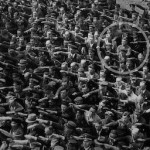The recent assassination of two New York City police officers by a sick, mentally deranged animal was truly a tragedy. A tragedy not because they were police officers, but because they were human beings. A tragedy not because of the manner of death, but the reasoning behind it. All evidence left behind by the gunmen (who shot himself) suggests he set out on this murderous rampage to get even with “the police” for the Michael Brown shooting death in Missouri. Revenge is an understandable, albeit dangerous and ultimately self-destructive, emotional response when directed at the particular individual that has done harm. But when it is directed at a group merely because that group shares a characteristic with a tortfeasor, that is the kind of wickedness that has inspired genocidal rampages. Actions taken against members of a group ignore the individual’s humanity by abstracting them into an amorphous blob of adjectival phrases. One is not killing a human being with hopes, dreams, loved ones and friends; no, one is killing “the police”, or “a Jew” or a “n-word” or “a fag”. Murder is so much simpler when the target’s humanity is stripped away.
Why is this pattern of “tribe on tribe” killing so common throughout history? Humans have an evolutionary tendency to lump things with a common trait together and then assume that all those things sharing that trait are identical in nature. If a tiger killed my neighbor, then all tigers are deadly. If a snake bit my neighbor and he died, then all snakes are dangerous. Those that recognized distinctive traits and properly categorized the natural world as dangerous or not dangerous and killed the dangerous ones tended to live longer and pass on their genes. Those that thought we should just give all tigers a chance, well, it didn’t work out so well for them. So in a very real sense the human instinct to engage in “-isms” is why we are here today to discuss how wrong it is now. That doesn’t excuse it, it simply helps us understand “why” this trait exists. But this vestige of our evolutionary past, like the appendix, serves no purpose today except in extreme situations (e.g. it’s still safe to assume all tigers in the wild are dangerous). Unfortunately this instinct, like the appendix, is not something we can shed easily, and therefore we must remain ever vigilant against it, lest it become inflamed to the point where the whole species is put at risk (nuclear annihilation).
To remain vigilant we must recognize its many forms. It is not always so neatly packaged into the frothing rants of hate-speech. Sometimes it wends its way into our psyche like the proverbial wolf in sheep’s clothing. Any sort of tribe mentality, such as the “us vs. them” fervor at a team-sporting event, has the potential to lead down this dark path. That’s not to say we shouldn’t cheer for “our” team, but please do recognize the emotions and language of this mindset speak to a tribal instinct: “we” won, “our” team is the best, “their” team is terrible, “their” fans are uncouth mouth-breathers, etc. Most people just pay lip service to these sorts of platitudes, they don’t mean it any more than they literally mean “god be with you” when saying “good-bye”. But there are some that do take such feelings quite literally (soccer hooliganism, post championship vandalism/rioting, etc.)
And let us not neglect to mention sport tribalism’s big brother – state tribalism, e.g. patriotism. Same idea, just a bigger team. Every country’s citizens (the most zealous ones anyway) think their country is the best in the world and that their people are better, in whatever metric you might care to name, than the people of other countries. And like a fractal pattern this mentality exists at all levels. I have witnessed first hand people tell me the folks in their county are better folk than from neighboring counties. Yes, that imaginary line in the dirt makes all the difference in the world.
Fealty to this patriotic instinct is what helps politicians stoke the flames of fear and envy that create an “us vs them” mindset as they seek to not only start wars, but establish all manner of governmental programs that benefit one group at the expense of another. The deaths of these police officers was indeed a tragedy carried out by an individual inspired in part by the fervor of tribalism. But let us not forget that any actions inspired by tribalism are evil, whether done by the many against the one, or the one against the many.







